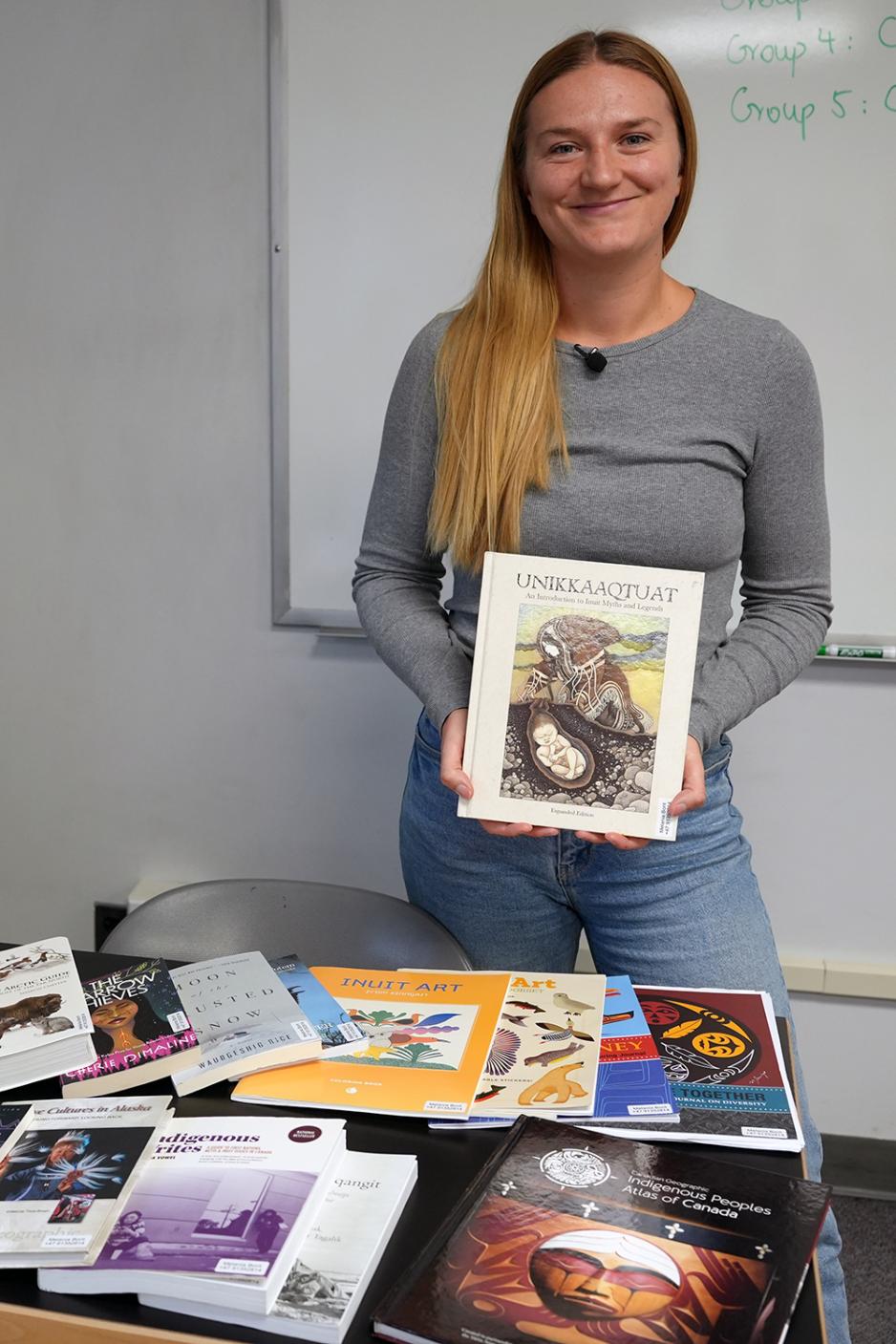The Arctic Scientist Profiles: Lena Leimgruber Studies Arctic Literature and Believes the Arts Is Needed in Arctic Discourse
Lena Leimgruber is a PhD candidate at Umeå University in Sweden. Here she is pictured during the Arctic Future Pathfinder's course, which was supposed to take place aboard the sailing ship Statsraad Lehmkuhl. (Photo: Karine Nigar Aarskog/UiT)
Doctoral student Lena Leimgruber at Umeå University thinks literature and the arts put the human into focus and provide an important perspective in Arctic discourse. "Literature can change you if you allow yourself to be part of it," she says to High North News.

Lena Leimgruber is a doctoral student in English literature at Umeå University in Sweden. (Photo: Karine Nigar Aarskog/UiT)
Lena Leimgruber is a doctoral student at Umeå University in Sweden. Her thesis focuses on English literature set in the Arctic, from both outsiders' and insiders' perspectives, using colonial frameworks.
She recently took part in the Arctic Future Pathfinders course, which was supposed to take place on the sailing ship Statsraad Lehmkuhl through the Northwest Passage, infamously cancelled due to ice conditions.
After spending the course on land in Arctic places such as Cambridge Bay (Iqaluktuuttiaq), Canada, and Alaska, USA, Leimgruber is now back in Umeå, where she will continue her work on Arctic literature.
But what role does literature research play in a landscape increasingly focused on defense, geopolitics and climate change?
"We tend to be very focused on what we think are facts or statistics, but the people are forgotten. The arts, whether that is literature, paintings, or music, put the human experience into focus in a geopolitical landscape. It is about being human in a time of change," Leimgruber says to High North News.
"The arts can help us look at things differently, and perhaps we can relate more to the arts than by watching the news, for example. It makes us realize that we are a part of something."
"However, it is not about who can do things better. There are things that science can do, and there are things that literature can do, and there are things they cannot do, respectively. Nonetheless, all perspectives are needed."
Where is the Arctic?
Leimgruber says that, like all Arctic researchers, she is always asked to define what the Arctic is.
"Of course, I am aware of common definitions of the Arctic, such as the 10-degree rule in July. But there are also cultural definitions of the Arctic. I mainly focus on novels taking place above the Arctic Circle. There is literary fiction that is set in the sub-Arctic that I might want to include as well, but I mainly focus on the High Arctic, such as where we were in Cambridge Bay."
How do you choose your literature?
"It is tricky to find literature set in the Arctic when you enter the field," answers Leimgruber. Her interest in Arctic literature, in particular, began with her doctoral studies and Umeå University's PhD listing.
She says that she has now encountered many bodies of work, including many that are not written in English. However, she can appreciate that many books are written in the authors' native languages, particularly Indigenous languages.
"Of course, I would love for them to originally have written the books in English because that would match the criteria for my thesis. At the same time, I appreciate when they are not," she says and continues:
"Sometimes, the books I read include a little glossary for words an English-speaking reader may not know. But maybe it is okay for non-Indigenous people to sometimes not understand, as that is quite a frequent experience from their side – having to adapt. So perhaps we can also learn to adapt and not always understand?" the researcher wonders.

Lena Leimgruber says it has been difficult to find English literature set in the Arctic. "A lot of novels don't frame themselves as Arctic. One strategy is to find books that include the word 'cold' or other typical Arctic adjectives in the title," she says about her approach. (Photo: Karine Nigar Aarskog/UiT)
The Arctic vs the North
What separates Arctic literature from other northern literature?
"The North as a concept is more relative, but the Arctic is more specific. Everyone has been to some form of North, but not many have been to the Arctic. Therefore, there is a lot of imagination involved in the idea of the Arctic. It is such an imagination-filled place," she states and continues:
"There are many things we think we know about the Arctic, but the Arctic can be so much. And what we don't know, we tend to imagine, and these narratives and ideas are passed on from one person to the next."
She believes this to be one of the reasons why Arctic literature is so significant, as it fills out some of the ideas about the region, allowing for more nuance and complexity.
The Arctic is an imagination-filled place.
The clichés of the Arctic
Arctic literature typically portrays the region as a cold, desolate, dark, isolated, and unforgiving place. Its role has often been to symbolize the unknown or how far someone is willing to go, such as in Mary Shelley's Frankenstein.
Does contemporary literature allow for a more nuanced portrayal of the Arctic, or does it continue down the same path?
"These images persist as they are still facts, but they are not the only facts," suggests the researcher.
"In the literature I read, other sides of the Arctic are also highlighted. But the hardships definitely remain, because that has been part of the imagined Arctic – it is supposed to be rough. But there are also more beautiful pictures of the Arctic now, more resilience, and focus on the different seasons, for example."
The mystery of the North
Another distinct and long-standing feature of Arctic literature is the prevalence of mystery and myth. Leimgruber says this is particularly true for historical fiction about the Arctic, in which the region is often illustrated as an uncanny place, a strange and mysterious setting.
"The Northern Lights, for example, show up in a lot of the literature, and they are portrayed as a very beautiful thing, but they are also veiled in myth."
The mystery of the Northern Lights is an important component of Philip Pullman's trilogy His Dark Materials, for example, where the lights reveal a 'city in the sky.'
You have to allow yourself to be a part of the fiction for it to have an effect.
The uncanny has also shown up as Leimgruber has explored the Indigenous literature of the Arctic, which surprisingly included a lot of horror stories.
"There seems to be a high interest in horror among Indigenous writers, and they are often linked to magic realism. The snow turns into creatures, the Northern Lights talk to the characters, and monsters are coming."
"However, an important point is that I would probably define these works as speculative fiction, but from an Indigenous point of view, they would not be speculative, because it is a form of reality and it is a part of their lives and their beliefs."
For those interested, many of these short stories can be found in these two anthologies of Arctic horror stories:
The center of climate change
The Arctic region is at the center of the climate crisis, warming at 2-3 times the global average. This is also reflected in the region's literature, according to the PhD candidate.
"Climate change is often either a very integral part of the novel, especially within the genre of cli-fi (climate change fiction), where the whole premise is change, or not a part of the novel at all. The North or the Arctic is repeatedly portrayed as the last frontier, the final place we can go to when everything else has been destroyed."
Do you think literature can actually create environmental awareness and engagement, or do you think that is a very idealistic way of thinking?
"Both yes and no. Like all types of fiction, it depends on the reader. I don't necessarily think it can change someone who doesn't believe in climate change, but I also don't think any of the other disciplines can do anything for those people either."
"Like all kinds of fiction, you have to allow yourself to be a part of the fiction for it to have an effect."
Empirical ecocriticism
While many of us can attest to the power of literature, its effect is generally quite intangible, and most importantly, unmeasurable.
Literature, or the arts in general, has always had a profound impact on humans, playing a vital role in our self-realisation and our understanding of life and the world around us.
Yet, the arts have often had to take a backseat to the neat and tangible results that can be produced within fields such as defense, politics, and natural and formal sciences.
Now, some researchers within ecocriticism are trying to change this. Empirical ecocriticism is a branch of ecocriticism that focuses on empirical studies of environmental narratives in literature, film, television, and so on, and its influence on various audiences, explains Leimgruber.
"It is a field where literary scholars use more qualitative research methods to examine the effect of a text on a reader. These things are not inherent to literary studies at all, but now people are trying to find out the effect of climate change texts on people and what they can do."
Recommendations from the researcher
When asked for recommendations for people who want to start reading literary fiction about/set in the Arctic, Leimgruber offers the following:
· Split Tooth by Tanya Tagaq blends autobiography, poetry and Inuit cosmology, evoking the Arctic not only as a place but as a living, spiritual force.
· Minds of Winter by Ed O'Loughlin moves between past and present, weaving real polar history with fictional narratives to explore how Arctic exploration continues to haunt our collective imagination.
· In The Ministry of Time, Kaliane Bradley reimagines a Franklin expedition officer brought into the present day, using speculative fiction to reflect on colonial legacies and cultural displacement.
· The Terror by Dan Simmons fictionalizes the doomed Franklin expedition, blending history, horror and environmental unease in a chilling portrait of imperial hubris. This is a fairly heavy novel as it deals with topics such as cannibalism and a lot of death.
· Finally, Solar by Ian McEwan offers a more satirical lens, following a morally flawed scientist whose Arctic journey exposes both environmental and human folly.
"Together, these works reflect the Arctic’s power to inspire stories that are historical and speculative, intimate and political, deeply local and urgently global," concludes the researcher.


